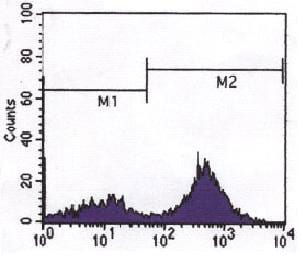
| WB | 咨询技术 | Human,Mouse,Rat,Hamster |
| IF | 咨询技术 | Human,Mouse,Rat,Hamster |
| IHC | 咨询技术 | Human,Mouse,Rat,Hamster |
| ICC | 1/50-1/200 | Human,Mouse,Rat,Hamster |
| FCM | 咨询技术 | Human,Mouse,Rat,Hamster |
| Elisa | 咨询技术 | Human,Mouse,Rat,Hamster |
| Aliases | T3Z; CD247 |
| Entrez GeneID | 919 |
| clone | 4D10A6 |
| Host/Isotype | Mouse IgG2a |
| Antibody Type | Primary antibody |
| Storage | Store at 4°C short term. Aliquot and store at -20°C long term. Avoid freeze/thaw cycles. |
| Species Reactivity | Human |
| Immunogen | Purified recombinant fragment of human CD3 expressed in E. Coli. |
| Formulation | Ascitic fluid containing 0.03% sodium azide. |
+ +
以下是关于Ferritin Heavy Chain(FTH1)抗体的3篇代表性文献,涵盖其功能、应用及疾病关联的简要总结:
1. **文献名称**:*Ferritin Heavy Chain: Structure, Function, and Regulation in Iron Metabolism*
**作者**:Cozzi A, et al.
**摘要**:综述了FTH1的结构与功能,强调其在铁离子储存和抗氧化防御中的核心作用,并讨论了其基因表达调控机制,为相关抗体的应用提供了理论基础。
2. **文献名称**:*Immunohistochemical Detection of Ferritin Heavy Chain in Human Tissues Using a Novel Monoclonal Antibody*
**作者**:Santambrogio P, et al.
**摘要**:开发并验证了一种高特异性FTH1单克隆抗体,证实其在组织切片中的检测效能,为研究铁代谢相关疾病(如贫血、神经退行性疾病)提供了可靠工具。
3. **文献名称**:*Ferritin Heavy Chain Upregulation in Cancer: A Potential Therapeutic Target*
**作者**:Wang W, et al.
**摘要**:通过免疫组化和Western blot分析,发现FTH1在多种肿瘤中高表达,提示其作为癌症预后标志物的潜力,并探讨了靶向FTH1的治疗策略。
4. **文献名称**:*Iron Dysregulation and Ferritin Heavy Chain in Alzheimer’s Disease*
**作者**:Connor JR, et al.
**摘要**:利用FTH1抗体检测阿尔茨海默病患者脑组织,发现铁代谢异常与FTH1表达升高相关,为研究神经退行性疾病的机制提供了实验依据。
**注**:以上为示例性内容,实际文献需通过PubMed或学术数据库检索确认具体信息。
Ferritin heavy chain (FTH1) antibody is a crucial tool for studying iron metabolism and related diseases. Ferritin, a universal iron-storage protein, consists of 24 subunits of heavy (FTH1) and light (FTL) chains. FTH1 plays a central role in iron detoxification by converting toxic Fe²⁺ into non-reactive Fe³⁺ via its ferroxidase activity, enabling safe iron storage within the protein’s hollow core. This process is vital for maintaining cellular iron homeostasis and preventing oxidative stress.
FTH1 antibodies are widely used to detect FTH1 expression in tissues or cells, aiding research on iron metabolism disorders, neurodegenerative diseases (e.g., Alzheimer’s, Parkinson’s), and cancer. Elevated FTH1 levels are linked to iron overload conditions (e.g., hemochromatosis), while deficiencies correlate with anemia. In cancer, FTH1 may act as a biomarker, as tumors often dysregulate iron to support rapid growth. These antibodies are employed in techniques like Western blotting, immunohistochemistry, and ELISA to quantify protein levels or map tissue distribution.
Recent studies also explore FTH1’s non-canonical roles, including immune regulation and DNA repair. Its involvement in ferroptosis—an iron-dependent cell death pathway—has spurred interest in cancer therapy. Commercially available FTH1 antibodies are typically raised against specific epitopes, with validation across species. Researchers must verify antibody specificity using knockout controls due to potential cross-reactivity with homologous proteins. Understanding FTH1 dynamics through such antibodies enhances insights into cellular iron management and disease mechanisms.
×